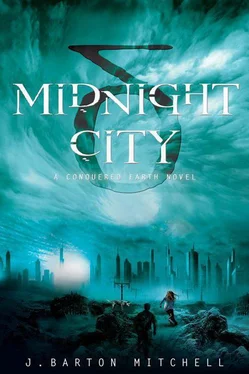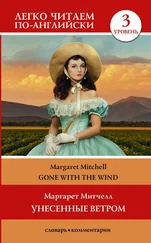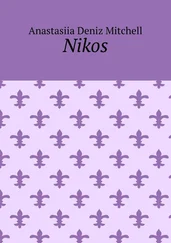Major factions in Midnight City were given caverns of their own in which to build compounds, and Los Lobos had one made of concrete and strong wood. It looked more like a fort than a clubhouse, somehow blended and bolted into the chaotic shapes of the cavern walls, which only reinforced it further. It was blocky, but it wasn’t all utilitarian. The concrete had been spray-painted graffiti style in shades of red, with swirling images and letters all centering around a huge stylistic rendering of a wolf’s head that covered the main wall.
“Los Lobos’ specialty is construction,” Mira told Holt quietly. “It’s the source of their Points. With the exception of the Gray Devils’ aqueducts, they built pretty much every structure in Midnight City, including the other faction compounds.”
Ahead of them was the main entryway, and it was an amazing sight: a giant refurbished bank vault door that had been bolted into a steel frame in the compound’s main wall. It still had the hand levers and combination lock, but they were backwards, facing toward the interior of the compound.
So it could be locked from the inside, Holt realized. He studied it appreciatively. It had been no small feat, repurposing something that big.
“How’d they get that all the way down here?” Holt asked. The door must have weighed several tons, at least.
“No one but Los Lobos knows that,” Mira said as they passed through the door. “But it involved artifacts, probably a Portal combined with half a dozen Aleves. Whatever they did, it took them only one night. Pretty impressive, and it got them a lot of Points.”
On the Scorewall, Midnight City reserved twelve spots for what were simply called “factions,” organized groups of resident survivors who lived and made their way together, not unlike the thousands of congregations that existed on the surface. The difference was, the factions were interested in Points.
A faction’s Points were determined by a complicated equation that took into account the point totals of its members, of its enemies, and of the achievements and failings of the faction as a whole. The faction that had the most Points was called the Prime Movers, a position that granted it a dominant voting percentage on the city’s supreme council. Which essentially meant, in no uncertain terms, that the Prime Movers ran Midnight City.
The current Prime Movers were the Gray Devils, Mira’s old faction, and they had held the title for more than three years.
After the main door, the concrete of the exterior gave way to yet more cavern walls. The outside was a fortified façade, Holt saw, which protected the more diverse cavern system of the compound beyond.
But it wasn’t just a cavern, either. A small “hall” opened up into an enormous room, several hundred feet in diameter. There were natural formed ledges on some of the walls, and ladders led up to them. On the ledges, Holt saw dozens of doors of all shapes and colors and origins built into nooks and crannies, leading to different parts of the compound.
But it was the huge room itself that was most impressive.
Dozens of cone-shaped stalactites dripped downward from far above, each circled with strings of Illuminators, hanging like petrified Christmas trees from the ceiling and bathing the room in a warm glow of pale white. The ceiling itself had been polished smooth, like rough wood sanded down.
And on the smooth surface, in between the stalactite formations, was an incredible collection of graffiti art. Images and symbols and shapes and writing, and not just in auburn red like the ones outside, but a myriad of colors that filled the ceiling, sparkling brightly underneath the stalactites.
Scaffolding and rope climbed up to the center of the ceiling, where a boy hung on his back, wearing goggles and a mask, and holding cans of paint in both hands. He was spraying the ceiling above him, adding to the giant canvas’s already brilliant colors, bringing to life a flowing script of writing.
The letters weaved in and out of a series of stalactites, a mix of purple and red and blue. Whatever it said, it was written in Spanish.
“Cesar!” one of the guards yelled up at the boy. He kept painting; if he’d heard the call, he showed no sign. “ Cesar! There’s a Gray Devil in the hall.”
The spray paint in the boy’s hand shut off, but he didn’t look down. “You’re wrong,” the boy said, and he slapped a set of clamps on his chest. The ropes that held him to the ceiling dropped him toward the floor, and he rode them down easily, slapping the clamps back into place right before he hit, stopping his fall. “She’s not a Gray Devil anymore. Are you, Mira?”
The boy who stood before them was all of fifteen, Hispanic with curly black hair, wearing a red T-shirt over black cargo pants, and easily the shortest person in the room. But short or tall, the way the other kids in the hall eyed him warily suggested he had a way of commanding respect. He stepped out of the harness, keeping his gaze on Mira.
“No, Cesar,” Mira said. “Not anymore.”
Cesar handed the two cans of spray paint to one of the other boys without looking at him and removed his mask and goggles. “My Sistine Chapel,” he said, motioning to the multicolored ceiling above them and smiling proudly. “What do you think?”
“I think it took a lot of paint,” Mira said without much enthusiasm. At the dismissive comment, the other faction members tensed.
But Cesar only laughed out loud, long and hard—though, to Holt’s ears, the sound contained a hint of menace. “You always were difficult to impress, Mira,” the little kid said, smiling wickedly. “But I always liked that about you.”
“The writing up there,” Holt said. “What does it say?”
At the sound of Holt’s voice, the smile vanished from Cesar’s face. His eyes moved from Mira to Holt, and Holt felt the weight of the little kid’s stare. There was something dangerous about the way the boy held himself, an unpredictability in his eyes that Holt had seen before with youths who got too much power too quickly. When you thought no one would stand up to you, there was very little you wouldn’t do if the urge struck you.
“It says ‘Al mal paso, darle prisa, ’” Cesar said.
“Which means—?”
Cesar studied Holt a moment more, then looked back to Mira. “This one wears no colors—he’s an Outsider. Why bring him into my compound?”
“He’s my friend, Outsider or not,” Mira said. “You’d be surprised, there’s lots of people worth knowing on the surface.”
Cesar spit, moved away, gazing up at the ceiling again. “The surface is past tense. Pathetic, ragtag groups scrounging in what’s left of a dead world, just trying to survive. Here, we do more than survive: We build things. We thrive. ”
“Thriving, perhaps,” Mira replied. “But still in second place.”
Cesar stiffened. He kept his back to them as he slowly looked down from the ceiling. “Did I ever tell you, Mira, that your name is a word in Spanish? It means ‘look.’” What little warmth was in his voice before, it vanished now. “It’s fitting, I think. You’re always looking for something, aren’t you? It’s what got you into trouble in the first place. And it’s what’s about to get you into trouble now.” He turned around, fixing her with a cold gaze. Any pretense of cordiality was gone, and the other Lobos instinctively took a step back. “What did you come here looking for, Mira Toombs? You’re either very brave or very stupid. My Points are on stupid, especially if you think I won’t hand you straight over to the council. You have any idea how much you’re worth now?”
“Turning me over would get you Points, that’s for sure,” Mira replied. “But handing me to the council is handing me to the Gray Devils.”
Читать дальше












